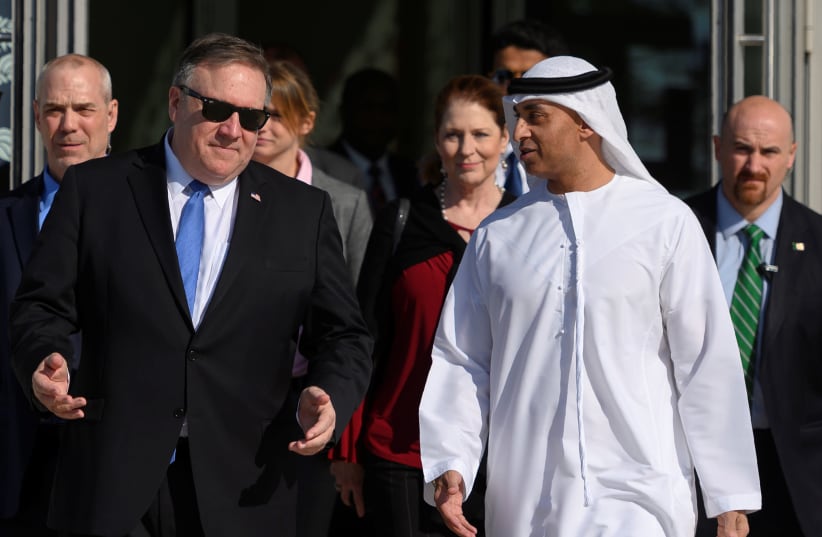Otaiba indicated that the peace deal’s time frame was an important issue. One of the issues that has faced the Gulf states since the Saudi Arabia-led Arab League initiative in 2002, is that peace was predicated on Israel making some sort of agreement with the Palestinians. That incentivized Palestinians to basically say no to an agreement because they could hold the absence of normalization over Israel.In the 1990s, many of the Gulf states had moved closer to Israel, sensing that economic and cultural exchange, as business globalization hubs, could benefit both sides. Later, Israel and the Gulf states became islands of stability in the maelstrom of the Middle East.Otaiba indicated that because Abu Dhabi does not have a history of war with Israel, the new relationship will look different than the cold peace that has developed with Jordan and Egypt.“The reason we believe we’re going to have a warm peace is that we have a young population and are not attached to history,” he said. “They spend most of their time thinking about their future, and they see opportunities with Israel. They see excitement; they see enthusiasm.”It is important that the US and others not see the Arab world as a monolith, Otaiba said. The region is divided between states that are linked to Turkey and the Muslim brotherhood, such as Qatar; those being blackmailed by pro-Iranian militias, such as Hezbollah; and the alliance linked to the UAE, such as Egypt, Saudi Arabia and Bahrain, he said.“Negotiating the deal took somewhere between four and five weeks; then we were just hammering out details,” Otaiba said. “Getting to ‘Yes’ was very quick and easy.”He attributed that to a tradition of trust and understanding and a shared worldview between Israel and the UAE regarding regional issues, such as opposition to Hamas and Hezbollah.THE OTHER win for the UAE was the F-35 deal, now valued at some $23 billion, according to reports. This will give Abu Dhabi game-changing military hardware that will vastly improve its defense systems and make it part of the strategic framework of the US and Israel in the region.Most of the conversations about the F-35, which the UAE has wanted for some time, began after the Abraham Accords were announced, Otaiba said. Conversations also indicated that it would not erode Israel’s qualitative military edge, a doctrine that means the IDF receives some of the best US military equipment. Israel also builds unique military technology that the US is acquiring, such as Iron Dome.However, what happens if other countries also want the F-35? Turkey was already part of the program but has not received the plane because Ankara is buying Russian air-defense systems. There are questions about whether Congress will support the F-35 sales.Otaiba also touched on the Iran deal, which he said was “a good deal. It just didn’t go far enough and didn’t address all the issues that bother us and Israel. There should be a deal with Iran, but let’s address all the problems and not just one of them.”That could reference Iran’s ballistic-missile program and other threats.“We haven’t talked about missiles, proxies and interference,” he said. “The new US administration has a lot of leverage on Iran – sanctions, low oil prices, the situation of COVID-19. Why not use that leverage to get a better deal?”The new deal with Israel has helped break a taboo, Otaiba said, and other states, such as Sudan, are now speaking to Israel.“Bahrain and Sudan followed right after,” he said. “This is not one or two countries doing something unconventional. This is a trend, a pattern.”The UAE still supports the two-state solution for the Palestinians, Otaiba said.“We’re going to have tough conversations with the Israeli government about the Palestinians and the Palestinian state,” he said. “This requires diplomacy and more importantly willingness and political courage from the leaders to make compromises and resolve this issue.”However, regardless of the tough conversations, today is a new day for the region. Otaiba’s message for Israelis is about excitement for a new relationship that will harness heritage, culture and people-to-people relations. Investment, research collaboration and maybe even discussions about the space program will follow, and the countries will work to combat COVID-19, he said.“I was talking to a young gentleman from the Economic Department in Abu Dhabi, and he said they’re overwhelmed by the number of Israeli companies that want to set up businesses in Abu Dhabi,” he said, adding that this can help a region that has high unemployment and economic struggles.The UAE believes it has crossed a kind of Rubicon, and today its approach will help the future of both societies, Otaiba said.“There are other countries who just prefer to look backwards and focus on religion and extremism,” he said.Special Interview: UAE Ambassador to the United States in a first appearance before the Israeli public https://t.co/2A03eMvgiv
— INSS (@INSSIsrael) November 11, 2020
UAE official on peace with Israel: Getting to 'yes' was quick, easy
He said that annexation is what made the country come to the decision to make peace with Israel at the time that it did.
